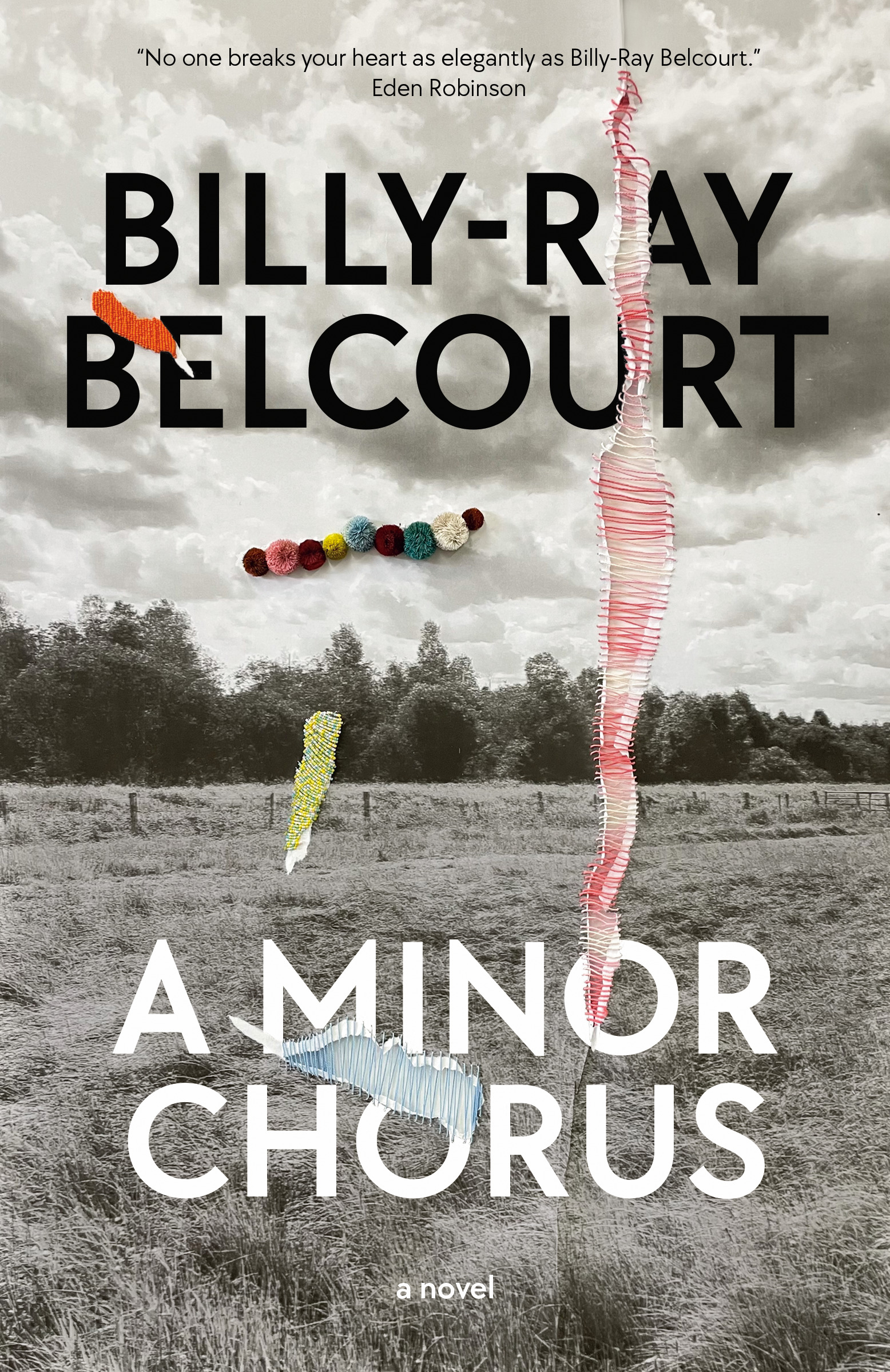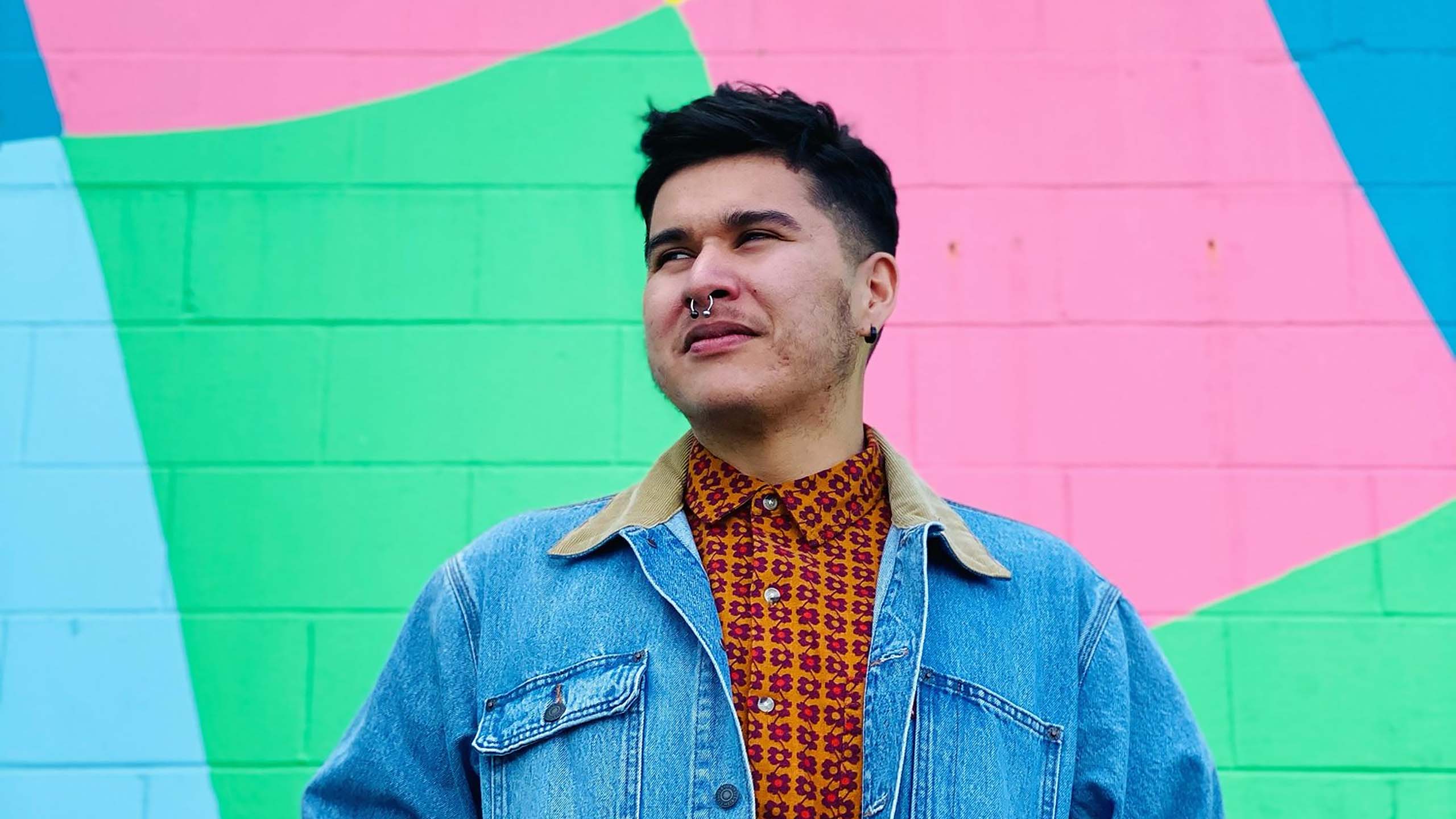In Billy-Ray Belcourt’s A Minor Chorus, an unnamed narrator wants to know: are you happy with your life?
It’s a question that’s been asked before, and explored many, many times. But Belcourt dives deep into our lived experiences to answer the ultimate question.

From the perspective of a narrator returning home after abandoning writing a thesis, Belcourt weaves a picture of rural versus urban Alberta, Indigenous lives living through colonization and the subversive nature of queer expression.
While it’s Belcourt’s first novel after several luscious works of poetry, A Minor Chorus is an absolute Ferrari. Just when the reader thinks Belcourt has pressed, urgently questioned and deeply contemplated, he manages to go one step further; the friction between possibility and constraint provides an insistent background score.
While the title of the book is A Minor Chorus, Belcourt’s foray into novel-writing is nothing less than a symphony. A Minor Chorus, released in September, has immediately become a national bestseller and was one of the 14 titles selected for the long list of the Scotiabank Giller Prize.
Belcourt, hailing from the Driftpile Cree Nation in Northern Alberta, published his first book, the poem-memoir This Wound Is a World, in 2017. Subsequent works of poetry and writing are NDN Coping Mechanisms: Notes from the Field, A History of My Brief Body: A Memoir, accompanied by A History of My Brief Body: Essays.
Xtra talked to Belcourt from his home in Vancouver in August, before he was long-listed for the Giller.
So tell me about the transition from writing poetry to writing a novel. It’s a big deal.
So in 2018, I became transfixed with what Roland Barthes calls the “fantasy of the novel,”
which I think, in my interpretation, is less about the novel itself and more so about what kind of aesthetic ideals the novel represents. At that time I was in grad school. I had just finished up my coursework in my PhD. Feeling alienated from my academic labour, I was kind of in a transitional period, trying to figure out what I wanted to do with my life. For whatever reason, the novel as a form seemed to provide some kind of refuge.
That being said, I failed to write a novel for a full year and wrote a lot of disastrous things that I didn’t do anything with. And then finally I figured out that if I was going to write a novel, if I had anything to say in the space of a novel, it was going to be about my life, a queer and Indigenous one.
Which makes total sense. And you see that a lot throughout the book. I was reading a previous interview that you did, where you said you wanted to write a book that felt communal at its core, kind of linking to the Indigenous and queer communities. For you, how does this book express this concept of communal?
I didn’t want to write a book just about myself. I’d already done that three times. And frankly, I had little about myself left to write about. I thought also, you know, the novel as it exists in the Anglophone world emerges out of this British tradition of hyper-individualism. So I was also aware that I could easily fall into the trap of individualism. When writing a novel, I didn’t want to do that. Because I’m interested, of course, in the social and political aspects of literature. So, one of the conceits of the novel is whether a single voice, the voice of a protagonist, an ordinary narrator, could in some way capture the emotional texture of an entire community, especially when that community, like the one in the novel, has been entirely neglected from literary consideration.
There’s that famous Joan Didion quote, “We tell ourselves stories in order to live.” In line with that, what are the kinds of stories that you want to tell in this novel? Because there’s so much texture, right?
There are a few things I was particularly interested in. First, I wanted to capture something of the experience of 20-something existential malaise. It’s this paradoxical experience where you’re so full of life, but on the other hand, there’s so much to be depressed about. That’s sort of what the narrator represents, that experience. But I was also interested—theoretically, but also materially—in how people, especially in the margins in rural areas, do or do not come to understand themselves as people who are shaped by historical forces. Many of the characters in the novel I mentioned are grappling with how their lives are historically contingent, so they don’t necessarily have that language. The narrator is in his head, analyzing it, perhaps on their behalf.
There are several characters who embody both the queer and Indigenous communities. Over the years, for both of those communities, there has been a reshaping of the historical narrative, for example, in different queer novels or movies or TV shows. Indigenous folks are having a stronger voice, including about how they’re represented. In that context, what’s your stake in that? What part of the retelling of our stories do you want to occupy?
I was interested in how dominant narratives, dominant queer narratives … leave behind certain experiences of ongoing subjugation, and so the character of Michael [a closeted man the protagonist encounters] represents that for me, the fact that in rural spaces it is immensely difficult to embody queerness. I understand why that narrative has been moved on from, because it requires a certain positioning of queer people as suffering. But I think there’s still value in attending to those experiences because they endure. They haven’t gone away. Also with the character of Graham [a gay man languishing over his first teenage love], I was interested in the complicatedness of sexuality. I didn’t want to necessarily feel like, “We’re Alberta, simply a space where heterosexuality is a norm,” but actually, there is all this negotiation of desire happening, and often in liminal spaces like hotel rooms.
I also noticed there were these ongoing feelings of longing and nostalgia. How does longing permeate the world of your characters, including the narrator?
The narrator has so much longing; he doesn’t know what to do with it. That might even be part of the conditions of possibility for his depression. Because academia is not the utopia of intellectual thought that he hoped it would be. It’s obviously governed by all these structures of oppression that govern other parts of the world. It’s really that he longs for another world, despite knowing that it is an impossible desire. Maybe impossible desires are part of the thematic core of the book. I think all the characters desire in excess of their environment or their conditions of living, and it all feeds itself, because then the longing for something that’s like, as you say impossible, then just it’s like this weird feedback loop for all of them.
Now I want to talk about Grindr, which pops up a few times in the book. What’s the relationship with Grindr? What’s Billy-Ray Belcourt’s relationship with it?
I’ve written about it so much over the course of my writing life. When I first started using Grindr, I used it obsessively, to the degree that it became synonymous with my sexual life. I thought of it as the only place where I existed as a sexual subject. Which, in retrospect, is detrimental, because of the various normative desires that govern Grindr users and how it is bound up in heteronormativity, whiteness and colonialism. I suppose I’m interested in the way that it requires queer Indigenous users, in particular, to desire or normalize our sexual marginalization. Which is a great ethical compromise, but at times in my life I felt it was a necessary one. Because we’re complex people and we don’t live in this utopian world, I wanted the novel to depict the sort of despair.
So I want to poke at the last bit of the book—where the narrator hopes to use the novel to answer the question of whether they’re happy. To that point: do you think anybody’s happy?
I think we all want to live happy lives, but that so rarely happens. When I was writing the book, I was in a period of depression, so now I think of the novel as a depressive form, that there’s some relationship between the novel and depression that is correlated. This is hammered home during a conversation I had with an editor in the U.S. when I was selling the book, who wanted the narrator to experience some kind of transformation by the end of the book, and for that to be clear. I felt disinterested in that because, first, the majority of the book really takes place over the course of a week. So, no one changes in the course of a week. But second, it made me realize that the narrator’s desire to write a novel, or to make art more generally, is about happiness because he is unhappy and he can’t figure out how to be happy. And so the novelist has lost his effort to generate happiness in his life. It’s in contradiction to all of the tragedy that he discusses with the people he interviews—at the end of all that tragedy and the emotionally taxing interviews, why should he be happy at the end of that?
Some of the stories in the book, like Michael’s, or the visit to the residential school, or the police violence and incarceration—these are all very deep graphic things. So I wondered about trying to be happy in the face of all that. What do you think about finding happiness amidst all of these very dark, oppressive things?
I knew that, despite trauma and tragedy, we Indigenous people and queer people produce joy in our lives. Even under conditions of duress, joy is possible. So I was cautious, and I hope that the characters in the novel don’t seem hopeless, but rather that their hope is what consoles them. So much of what happens in the novel—or anything resembling a plot—is sort of backstory—characters recounting events that have taken place, because I didn’t want to set the events in the present because that can invite voyeurism or fetishization. I’d rather want the characters to all have survived something, and so are able to tell that story of survival. I don’t like this word, but it’s like resiliency almost. Like, “Hi, I’m still here, despite the world trying to kill me in various ways.”
What’s the message that you want the people who are going to read this to take away from a novel about writing a novel?
Hmmm. I want readers to be confronted by what expectations they bring to novels. I think of it as a postmodern novel in that it continuously makes the reader aware that it’s a novel and that it’s being constructed. It’s not some simple reflection of life, or rather a representation of it. Because their presentation is ethical, I also want readers to think about the way that stories are about communities, how we exist in relation to others. So we are never truly alone.
I think of something the narrator says in the later part of the book, which is that we’re all trying to break out of the preconceived notions that are imposed upon us, whether we’re queer or Indigenous or both. That seems to me like the work of literature—to break out of preconceived notions.
This interview has been edited for length and clarity.


 Why you can trust Xtra
Why you can trust Xtra


